Abstract
The article presents the results of a study of the attitude of students of pedagogical specialties towards academic fraud. This phenomenon is considered as a factor that reduces the quality of higher education. The article provides an overview of research on the problem of academic fraud. Such line of research as the dynamics of this problem in the study process and determination of individual and contextual factors and conditions of its emergence are identified. The results of the authors' empirical research confirmed the high prevalence of academic fraud among students. Students' attitudes towards academic fraud were found to be contradictory. On the one hand, students know which forms of academic behavior are unacceptable and believe that punishment for such behavior should be unavoidable. On the other hand, a lenient attitude towards academic fraud was revealed. According to the results of the questionnaire, students think that the most effective ways of eliminating academic cheating are the use of unique assignments both individually and for groups, as well as providing the opportunity to use supplementary materials on the exam. The obvious conclusion is that such suggestions set new tasks for the teacher associated with the need to develop special assessment tools and a special examination methodology.
Keywords: Quality of education, academic fraud, students, education studies
Introduction
The concept of “quality of education” was introduced in Russia in the early 1990s by an article on state control over the quality of education included in the Act of the Russian Federation of July 10, 1992 “On Education”. Its further development continued later in connection with the adoption of the Federal Law “On Education in the Russian Federation” (2012), which defined this concept. The quality of education was defined as a complex characteristic of educational activities and training of a student that reflects the degree of their compliance with federal state educational standards, federal state requirements and (or) the needs of an individual or legal entity in whose interests educational activities are carried out (Federal Law “On Education in the Russian Federation”, 2012).
Currently, there are different approaches to assessing the quality of education. Scientists and educators put forward different interpretations of this concept. It is important to note that in all these interpretations the emphasis is put on the positive side of this concept: for example, the quality of education is determined through the degree of correspondence of theoretical knowledge and skills to their application in life and professional activity with the development of a person's need for constant updating of his knowledge and skills (Bordovskaya & Rean, 2006) or (another approach) as a set of properties of education, which determines the adaptability of this system to the implementation of social goals for the formation and development of a personality in terms of training, good manners, the expressiveness of social, mental and physical properties (Panasyuk & Tretyakova, 2018).
The problem of understanding the nature of the quality of higher education is studied both at the theoretical and practical levels. For example, Tretyakova et al. (2017) formulated their ideas about how the quality of higher education is ensured. In particular, they claim that this problem is systemic, and to solve it, one should involve many directions of university functioning, and there should be no weak links in this chain. Practical methods for assessing the quality of education in universities are also proposed (Myalkina, 2019).
It is possible to say that we are currently facing a contradiction. On the one hand, pedagogy studies the indicators of the high-quality education as it is, whereas factors that reduces the quality of education are left unattended. At the same time, there is an opinion that, unfortunately, today the low quality of education, including higher education, is one of the most pressing problems of our society. Denisova-Schmidt and Leontyeva (2015) claim that despite the formally declared strategies for improving the quality of education, in reality the university forms an internal environment that is comfortable for the “unteachables”. In turn, Lazareva (2016) believes that one of the reasons for the low quality of higher education is the low motivation of students to study at the university. She thinks that many students are focused on formal signs, i.e. grades, and not on the content of education, for them it is important to get a diploma, and not the knowledge that is necessary for professional activity.
Iogolevich and Lobodenko (2020) also believe that today the quality of personnel training is a decisive factor in innovative development of any state and acts as a guarantor of its economic and technological security. In this regard, the problem of unscrupulous behavior of students when performing educational and test tasks is relevant, since it directly determines the quality and effectiveness of training the competitive human potential of our country. This is how they characterize the existing risk of student misconduct: Unscrupulous behavior of students in relation to learning reduces the quality and effectiveness of education, turning the educational process into its imitation. The university graduates low-qualified specialists, or rather, amateurs and non-professionals with high self-esteem, since they have diplomas with high marks that do not correspond to the real level of competencies of their owners (Iogolevich & Lobodenko, 2020, p. 100).
Thus, this research is relevant due to the need to study the factors that reduce the quality of education, including academic fraud.
Problem Statement
At present, one can notice a growing interest in studying the problem of academic fraud in our country. So, Shmeleva (2015) believes that academic fraud is widespread in both Russian and foreign universities. According to Shmeleva, academic fraud refers to dishonest practices or activities prohibited by the rules of the university, related to educational activities and carried out by students to achieve an unfair advantage in their studies. In her opinion, cheating on tests or exams, incorrect borrowing of fragments of texts when creating written works (plagiarism), unauthorized cooperation with other students when completing an individual assignment can be attributed to academic fraud.
When investigating the problem of academic fraud, scientists pay attention to various aspects. There are studies devoted to the dynamics of attitudes towards academic cheating of students in the process of studying at a university. For example, Denisova-Schmidt et al. (2016) compared the attitudes of first and fifth year students towards corruption in general and university corruption in particular (empirical data were obtained on the basis of individual state universities in Khabarovsk). The results showed that fifth-year students are more open to various informal and corrupt practices than freshmen. As a conclusion, the authors point to the possibility that the Russian higher education system may “favor” the enforcement of corrupt and informal practices.
Chirikov and Shmeleva (2020) agree with this. Based on the results of their research, they argue that Russian universities implicitly encourage cheating in exams and plagiarism in written works. Students increasingly deceive and develop a tolerance for academic dishonesty in their studies.
Numerous studies identify the factors and conditions for the occurrence of academic fraud. In this regard, scientists studying this problem pay attention to the study of personality traits that determine the use of various forms of academic fraud by students. David (2015) identified a link between academic cheating of college students and their personal values, self-esteem, and professionalism. According to her, the level of self-esteem and professionalism, the value of ‘honesty” and academic performance are negatively associated with deception.
Another study by Yu et al. (2016) was devoted to the individual factors that contribute to college cheating. They found that academic fraud was largely associated with 1) demographic characteristics (gender, socioeconomic status, college year), 2) personality traits (for example, lack of self-control, altruism) 3) college experience (for example, academic performance, participation in extracurricular activities, etc.), 4) the attitude of other students towards academic fraud, and the perception of teachers' actions against fraud and fraudulent environment.
It should be noted that many scientists pay great attention to the study of the relationship between academic fraud and motivation. Anderman and Koenka (2017) state that teachers can use a variety of learning practices in their work and maintain an academic environment that strengthens the positive motivational beliefs of students, potentially reducing academic dishonesty.
Shmeleva (2016) also conducted a study of the factors and conditions that influence the occurrence and spread of academic fraud among students. Later, together with Shmeleva and Semenova (2019), they studied the factors that determine the possibility of academic fraud. They noted the fact that this phenomenon is often associated with the low level of study motivation, which is confirmed by a number of Russian and foreign studies. However, the role of study motivation might be overestimated, since such studies, as a rule, do not control the characteristics of the educational environment, the behavior of teachers and students. According to them, the main predictor of both plagiarism and cheating is the idea of “honesty of the environment”, that is, how common these practices are among students.
The study of Roshchina (2017) is of a particular interest. She found that increased moral costs have a significant negative impact on the likelihood of cheating. In addition, such an increase diminishes the importance of the impact of academic performance on the likelihood of cheating.
The specificity of attitudes towards academic fraud of students of different specialties is also being studied. Iogolevich and Lobodenko (2020) studied attitudes towards academic fraud among engineering students. They found that more than half of the tech students participating in the study did not consider plagiarism to be fraudulent. The authors of the article also state that students who are loyal to academic fraud expect the same tolerant attitude and mild penalties from teachers when it is detected, especially during interim assessment. Iogolevich and Lobodenko (2020) claim that, unfortunately, in the context of the introduction of a business management culture with its indicators of efficiency, competitiveness, calculability and control into the education sector, this process is gaining momentum, and is not localizing or fading.
Research Questions
Hence, the following questions are central to our study:
Do students understand what actions and forms of behaviour can be considered as academic fraud?
What are student attitudes toward academic fraud?
Do pedagogical students resort to academic fraud?
Purpose of the Study
To study the peculiarities of attitudes towards academic fraud of students of pedagogical specialties.
Research Methods
A written survey in the form of an anonymous questionnaire was used as a research method. The questions were about a) assessing the understanding of what constitutes academic fraud; b) assessing the degree of its prevalence among students; c) ideas of punishment for academic fraud; d) students' understanding the ways of eradicating academic fraud; e) characterization of one's own behavior associated with various forms of academic fraud. The questions partially coincided with those presented in the works of domestic scientists on this issue.
115 students of pedagogical specialties took part in this study. A feature of this sample of students was also the fact that they studied remotely during April – June 2020, which made it necessary for them to complete a large number of written and control tasks that they had to submit in distance courses. This increased the possibility of resorting to different forms of academic fraud: copying large chunks of text from the Internet, cheating, receiving hints, etc. The choice of this category of students is also due to the understanding of the importance of the fact that the prevalence of various forms of academic fraud is related to the way teachers treat it. It is important to understand the attitude of future teachers towards this phenomenon in order to assess the possibility of its transfer to their students during work.
Findings
Initially, we investigated students' ideas about what exactly is a fraud and what forms of behavior are allowed (Figure 01).
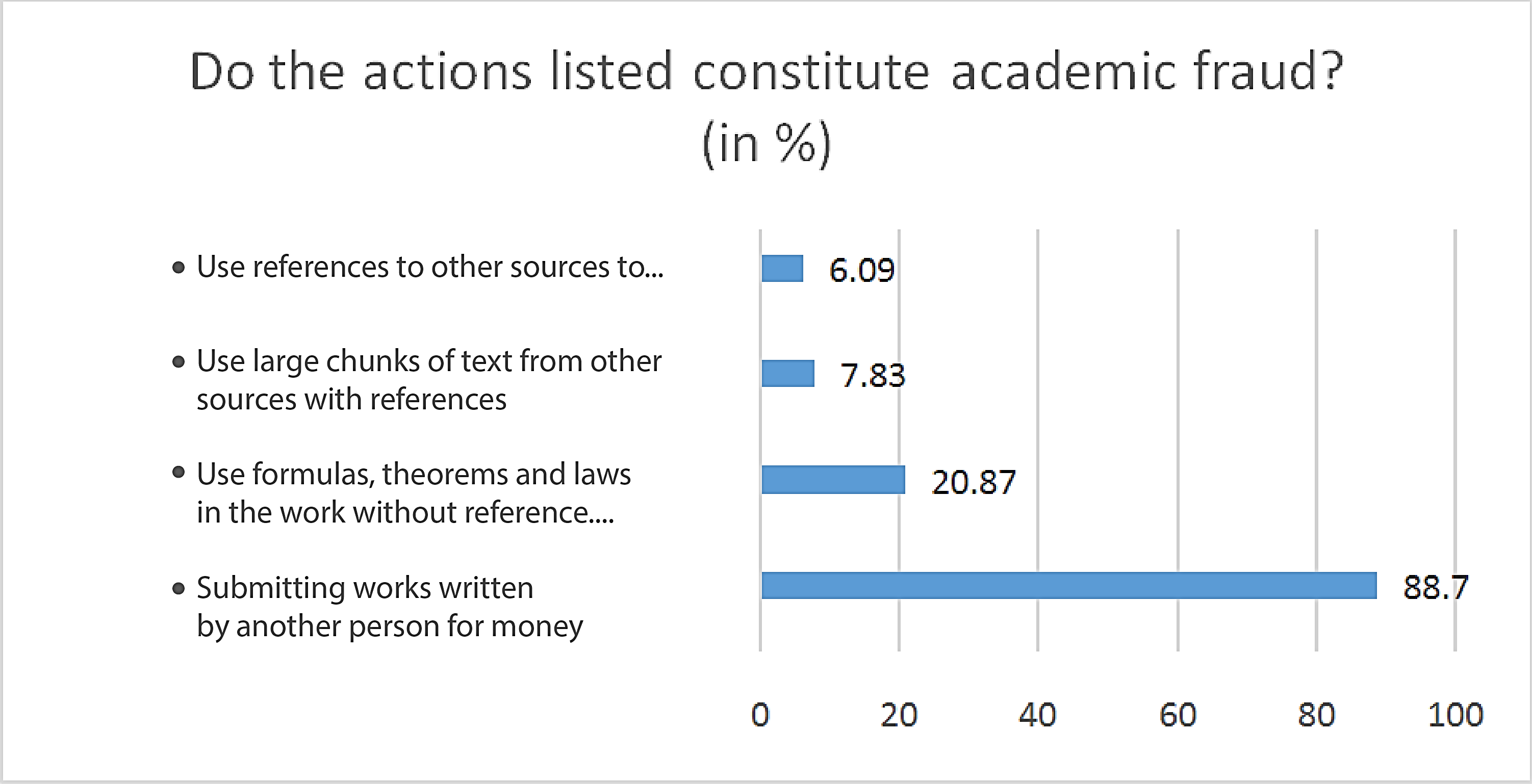
Research results indicate that most students know what constitutes correct behavior and what constitutes academic fraud. Most of the students are convinced that “submitting works written by another person for money” is an academic fraud. At the same time, most students know that it is quite possible to “use large chunks of text from other sources with references” and “use references to other sources to argue your point of view”. An important argument in this case is that this material is not impersonal, the author is indicated. There are doubts as to whether it is possible to use formulas, theorems and laws in the work without reference to sources. On the one hand, this information is very widespread and accessible to a wide audience, but on the other hand, it remains a question for many students whether it can be used without reference or citation is still necessary. Perhaps this is the question the teacher should answer when teaching the corresponding discipline.
The next question was devoted to the student's assessment of the prevalence of academic fraud in higher education institutions – “What is the students’ attitude towards academic fraud?”
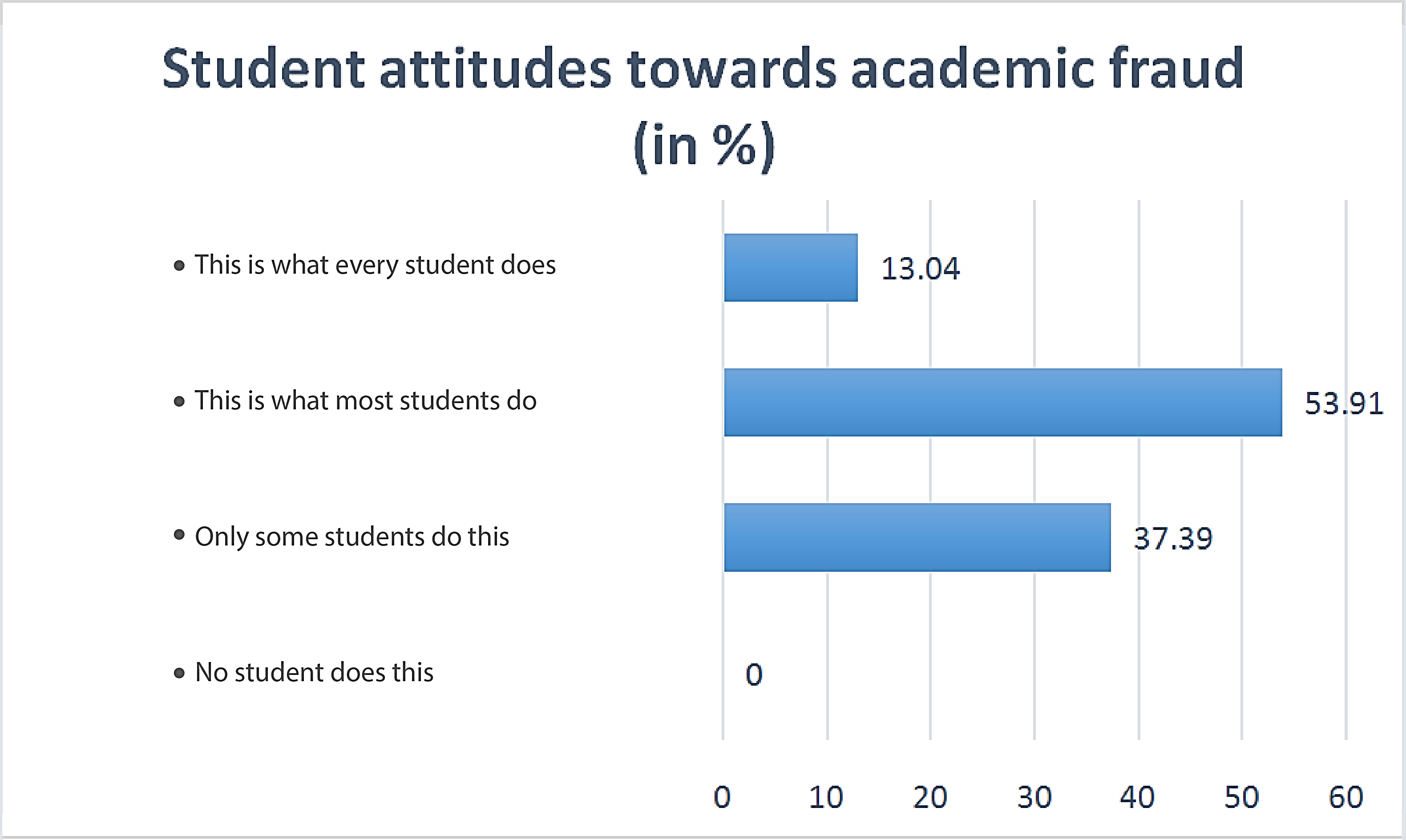
The results of the study (Figure 02) showed that students consider different forms of academic fraud as a common practice in learning. More than half of the study participants believe that most students do such things, a smaller proportion believe that only some do so, and there is a group of students who believe that everyone does so. No one agreed with the statement that “no student does this”, apparently because students see what is happening in the learning process. Perhaps, such a response also indicates the sincerity of the answers to the questionnaire.
The third question in the questionnaire is “If a teacher notices that a student is cheating on an exam or test, what do you think he or she should do?”– concerned perceptions of the penalties for academic fraud. The results obtained are presented in Figure 03.
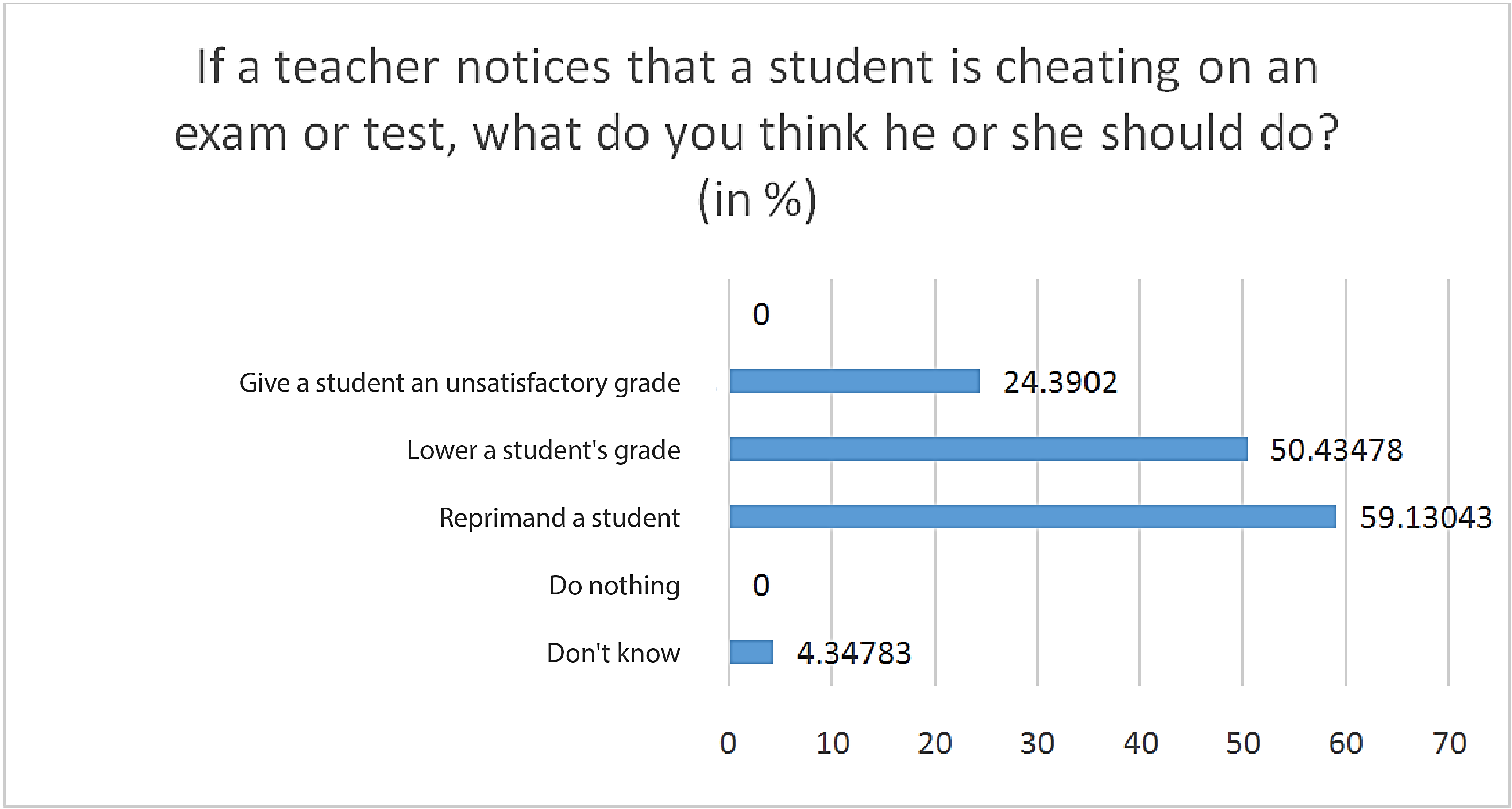
The answers to this question indicate that students believe that cheating is still a misconduct that should be punished – there are no students who believe that the teacher should not do anything under these conditions. At the same time, such an act, from their point of view, is not a serious offense. Students believe that such behavior should be punished, but the punishment should not be severe: a verbal remark or a lowered grade. A small part of students (about a quarter of the total) believe that a more serious punishment is possible – an unsatisfactory mark for an exam or a test. From the students' point of view, reporting such a student's action to the direction is an unnecessary measure. None of the study participants considered such a consequence to be justified.
Another question in the questionnaire was devoted to the characteristics of students' perceptions of the ways of eliminating academic fraud: “Ways to eliminate academic fraud from the point of view of students” It was proposed to evaluate the effectiveness of forms of prevention of such behavior and possible punishment.
The results obtained indicate that, according to students, the most effective way to prevent cheating will be its permission – they propose to allow the use of complementary study materials (Figure 04). Another effective measure would be the use of unique tasks and individual assignments for each student, as well as an emphasis on project and collective assignments that focus on unique topics. In addition, the initial acquaintance of students with the examination and test rules can prevent various forms of academic fraud. The least effective measure of cheating prevention, according to survey participants, is a special seating arrangement for students. We can agree with this. Using cheat sheets and smartphones is possible with any seating arrangement.
Another aspect of studying different ways of eliminating academic fraud was associated with the assessment of the importance of characteristics of different penalties for academic dishonesty. It was proposed to assess the need for the inevitability, severity and celerity of punishment. The results indicate that the students consider the inevitability of a punishment to be the most important aspect of its fairness. (Figure 05). The celerity of a punishment is insignificant. The students also disagree with the opinion that the punishment should be severe. This, in our opinion, is a continuation of the idea that in case of cheating, the teacher should confine himself or herself to a verbal remark.
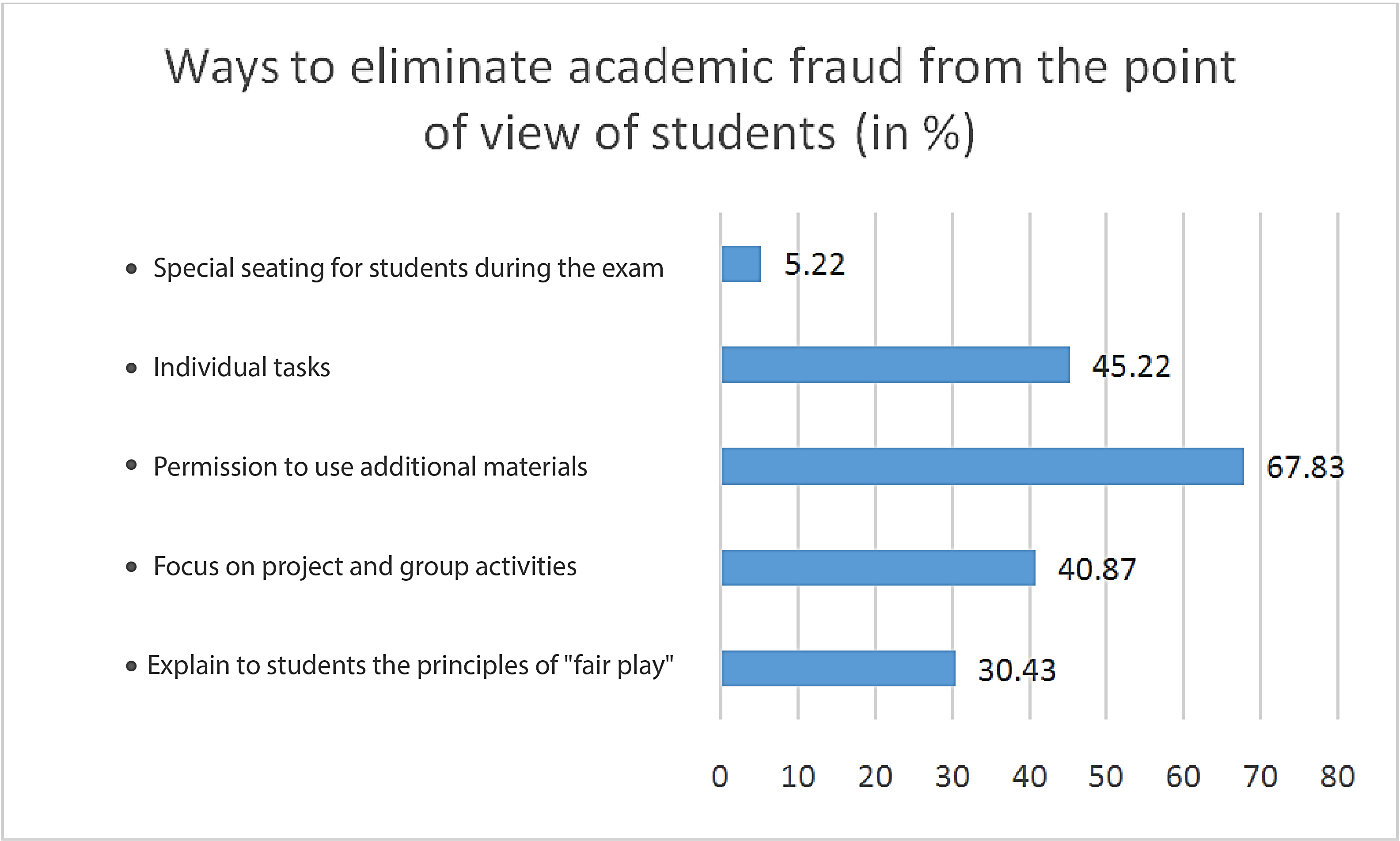
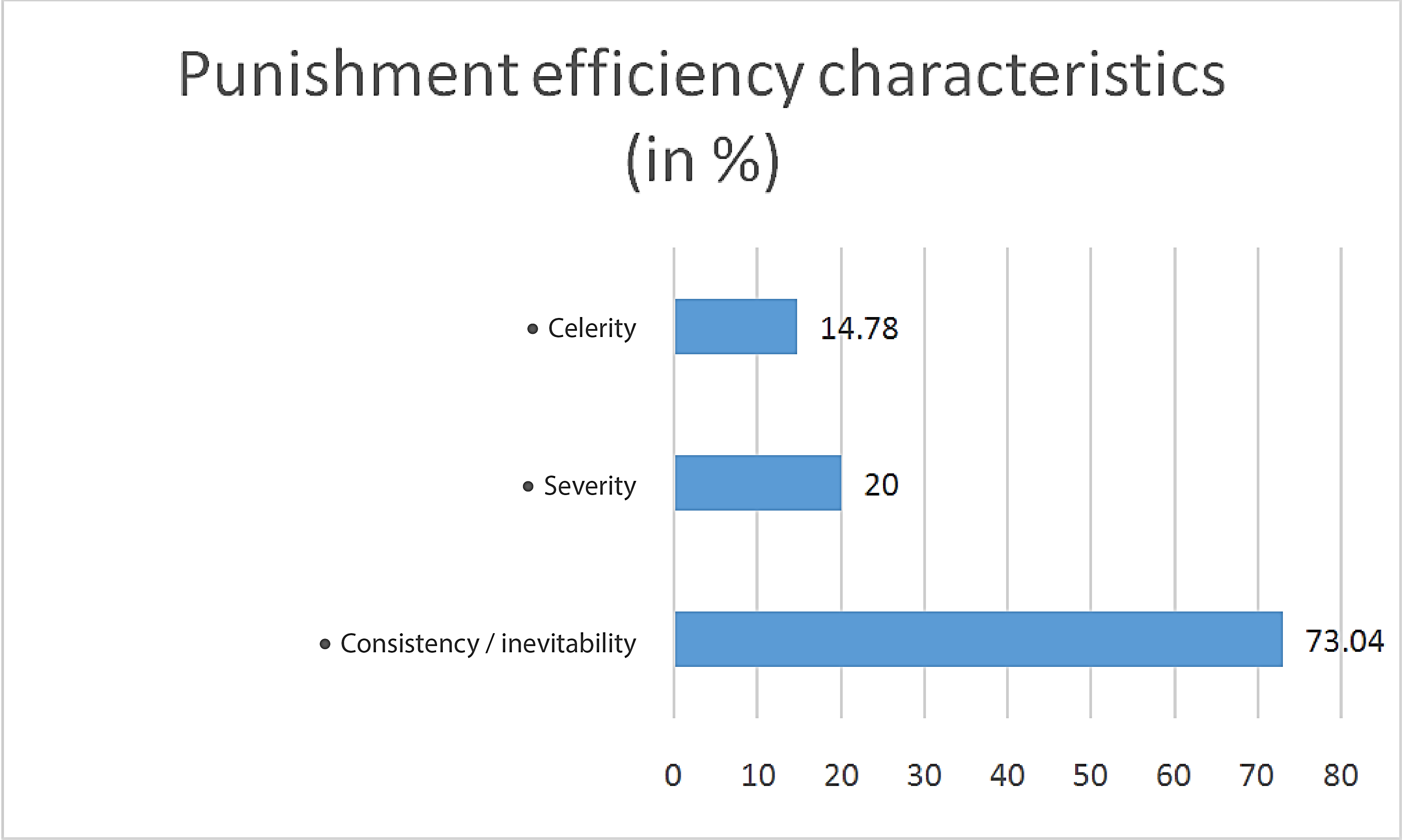
The last question of our questionnaire directly concerned the behavior of the students themselves: they were asked to think whether they often had to resort to various forms of academic fraud during their studies.
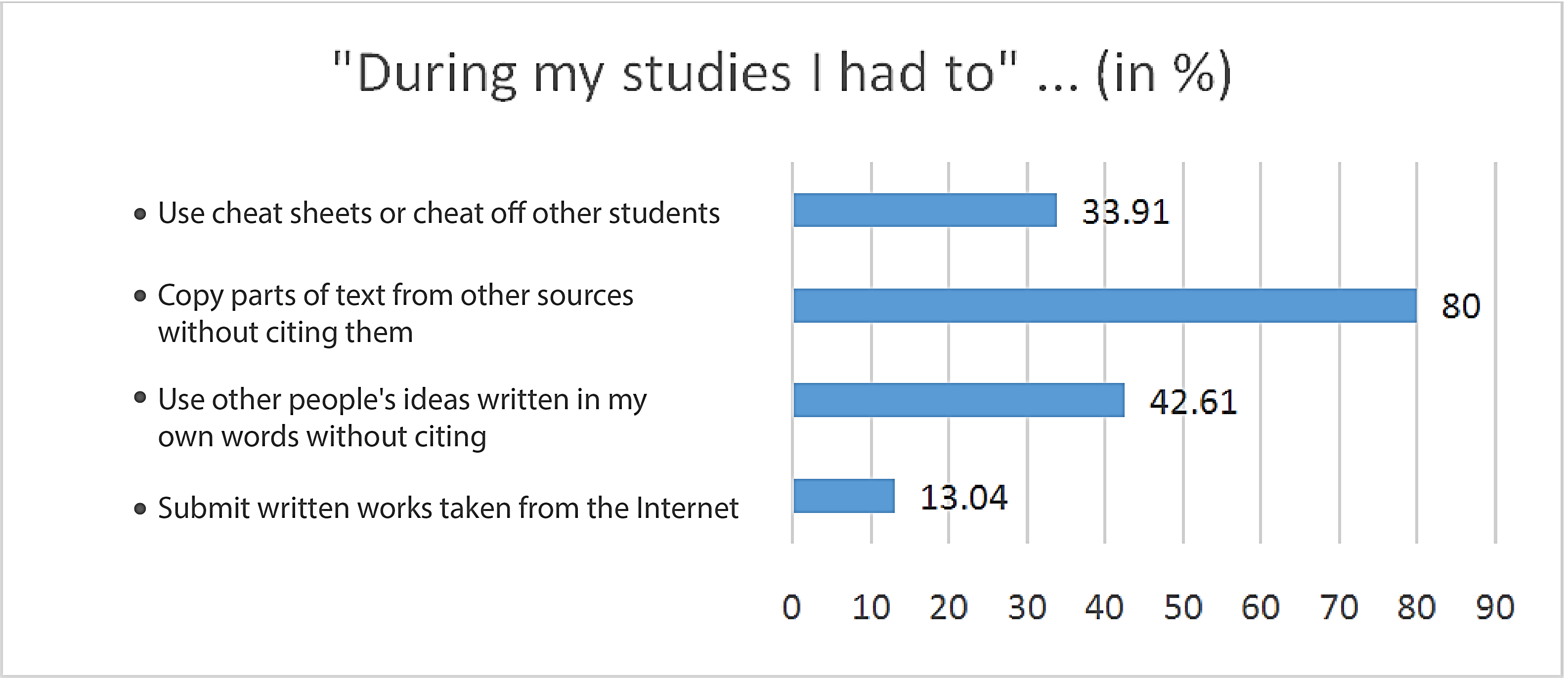
The results indicate a high prevalence of academic fraud among the study participants (Figure 06). It turned out that a very large proportion of students copy parts of texts from the Internet without citing them. Many people resort to using other people's ideas written in their own words without reference, the use of cheat sheets is a little less common. The relative non-prevalence of cheat sheets may be due to the fact that students who participated in the study had a summer session in a distant format, not all teachers used oral exams, and it was difficult to track student behavior in oral exams. All this made it possible to use telephones or other technical means at once, without preparing cheat sheets. The smallest, but still significant, percentage of students use papers downloaded from the Internet. At the same time, students have an understanding that this is a fraud. In other words, they deliberately cheat
Conclusion
Our research allows us to draw the following conclusions.
It has been confirmed that academic fraud is widespread among the student body. It is important to recall that these are teacher training students, some of whom will be working with students. The question remains how this behavior of students – future teachers, will affect the quality of their work, including the formation of the attitude of their future students towards fraud in the educational process.
The results of our research allow us to state that the attitude to the phenomenon under study can be seen as contradictory, ambivalent. On the one hand, students know which forms of behavior are unacceptable in the educational process, and how to act accordingly. They also believe that the punishment for such behavior should be inevitable. Academic fraud misconduct, on the other hand, is viewed very leniently by students. This attitude is evidenced, firstly, by the idea that most, if not all, students cheat in the learning process and, secondly, by the idea that punishment for such misconducts should be very mild – a teacher's reprimand or, as a last resort, an unsatisfactory mark is enough.
Obviously, with academic fraud being so widespread among students, the serious question of preventing it must be raised. According to the results of the questionnaire, students think that the most effective ways of eliminating academic cheating are the use of unique assignments both individually and for groups, as well as providing the opportunity to use supplementary materials on the exam. Such suggestions set new tasks for the teacher associated with the need to develop special assessment tools and a special examination methodology.
Another important aspect should be noted. Even if individual assignments are provided, students still have the opportunity to cheat if there is no fine-tuned control system for work process. One can see that students still want justice, they are not opposed to the detection of cases of fraud. They only oppose the harshness of punishment for such acts.
The results obtained are of particular concern in due to the widespread use of distance education. It is more difficult to check the process of completing tasks and to assess the independence of thinking in conditions of distance learning than in normal conditions. The temptation to resort to various forms of fraud in conditions of reduced control over the learning process is growing. Accordingly, when introducing distance courses, it is necessary to pay great attention to the development of forms and methods for assessing knowledge, to introduce the use of various kinds of technical means to check the originality of not only term papers and theses, but also independent tasks – notes, exercises, etc.
References
Anderman, E. M., & Koenka, A. C. (2017). The relation between academic motivation and cheating. Theory into Practice, 56(2), 95-102.
Bordovskaya, N.V., & Rean, A. A. (2006). Pedagogica [Pedagogy]. Peter.
Chirikov, I., &Shmeleva, E. (2020). How to stop the growing tide of student dishonesty in Russia? In E. Denisova-Schidt (Ed.), Corruption in Higher Education: Global Challenges and Responses. Global Perspectives on Higher Education (pp. 152-156). Sense.
David, L. T. (2015). Academic cheating in college students: relations among personal values, self-esteem and mastery. Procedia– Social and Behavioral Sciences, 187, 88-92.
Denisova-Schmidt, E., Huber, M., & Leontyeva, E. (2016). On the development of students’ attitudes towards corruption and cheating in Russian universities. European Journal of Higher Education, 6(2), 128-143.
Denisova-Schmidt, E.V., & Leontieva, E.O. (2015). Kategoriya “neobuchaemyh” studentov kak social'nyj fenomen universitetov (na primere dal'nevostochnyh vuzov) [The category of “unteachable” students as a social phenomenon of universities (on the example of Far Eastern universities)]. Sociologicheskie issledovaniya [Sociological research], 9, 86-93.
Federal Law “Ob obrazovanii v Rossijskoj Federacii” [“On Education in the Russian Federation”] (2012). No. 273-FZ from December 29, 2012. http://www.consultant.ru/document/cons_doc_LAW_140174/
Iogolevich, N. I., & Lobodenko, E. I. (2020). Akademicheskaya nedobrosovestnost' studentov tekhnicheskogo vuza: masshtaby problemy i puti resheniya [Academic dishonesty of students of a technical university: the scale of the problem and solutions.] Pedagogika. Voprosy teorii i praktiki [Pedagogy. Issues of theory and practice], 5(1), 99-106.
Lazareva, O. P. (2016). Problema motivacii studentov vuza k obucheniyu [The problem of motivating university students to study]. Mezhdunarodnyj nauchno-issledovatel'skij zhurnal [International research journal], 8(50-5), 46-48.
Myalkina, E. V. (2019). Diagnostika kachestva obrazovaniya v vuze [Assessment of the quality of education at the university.] Vestnik Mininskogo universiteta [Minin University Bulletin], 7(3).
Panasyuk, V. P., & Tretyakova, N. V. (2018). Kachestvo obrazovaniya: innovacionnye tendencii i upravlenie [Quality of education: innovative trends and management]. Publishing house of the Russian State Pedagogical University.
Roshchina, Ya. A. (2017). Bor'ba so spisyvaniem v studencheskoj srede. Vazhno li sledit' za studentami vo vremya pis'mennyh rabot? [Fight against academic dishonesty in the student environment. Is it important to supervise students during written work?]. Vestnik Moskovskogo universiteta. Seriya 6. Ekonomika [Moscow University Bulletin. Series 6. Economics], 2, 107-127.
Shmeleva, E. (2016). Plagiat i spisyvanie v rossiyskikh vuzakh: rol' obrazovatel'noy sredy i individual'nykh kharakteristik studenta. [Plagiarism and cheating in Russian universities: The role of the learning environment and personal characteristics of students]. Voprosy obrazovaniya [Educational Studies Moscow], 1, 84-109. DOI:
Shmeleva, E. D. (2015). Akademicheskoe moshennichestvo v sovremennyh universitetah: obzor teoreticheskih podhodov i rezul'tatov empiricheskih issledovanij [Academic fraud in modern universities: review of theoretical approaches and results of empirical research]. Ekonomicheskaya sociologiya [Economic Sociology], 16(2), 55-79.
Shmeleva, E., & Semenova, T. (2019). Akademicheskoe moshennichestvo studentov: uchebnaya motivatsiya vs obrazovatel'naya sreda. [Academic dishonesty among college students: academic motivation vs contextual factors]. Voprosy obrazovaniya [Educational Studies Moscow], 3, 101-129. DOI:
Tretyakova, T. V., Ignatiev, V. P., Barakhsanova, E. A., & Varlamova, L. F. (2017). Kachestvo obrazovaniya kak garantiya effektivnosti vuza [Quality of education as a guarantee of university efficiency]. Sovremennye problemy nauki i obrazovaniya [Contemporary Problems of Science and Education], 2, 163.
Yu, H., Glanzer, P. L, Sriram, R., Johnson, B. R., & Moore, B. (2016). What Contributes to College Students’ Cheating? A Study of Individual Factors, Ethics & Behavior, 27(5), 401-422. DOI:
Copyright information

This work is licensed under a Creative Commons Attribution-NonCommercial-NoDerivatives 4.0 International License.
About this article
Publication Date
15 July 2021
Article Doi
eBook ISBN
978-1-80296-113-3
Publisher
European Publisher
Volume
114
Print ISBN (optional)
-
Edition Number
1st Edition
Pages
1-778
Subjects
Globalization, digital education, leadership, challenges of the time, оn-line pedagogy, universal and national values
Cite this article as:
Archireeva, T., & Gadzhibabaeva, D. (2021). Attitude Of Pedagogical Students Towards Academic Fraud. In A. G. Shirin, M. V. Zvyaglova, O. A. Fikhtner, E. Y. Ignateva, & N. A. Shaydorova (Eds.), Education in a Changing World: Global Challenges and National Priorities, vol 114. European Proceedings of Social and Behavioural Sciences (pp. 552-562). European Publisher. https://doi.org/10.15405/epsbs.2021.07.02.66

